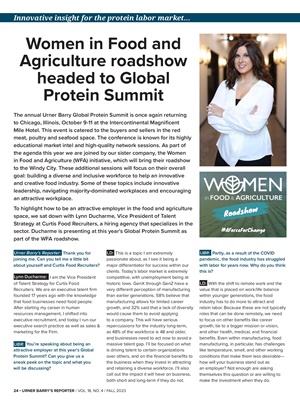
24 • URNER BARRY'S REPORTER / VOL. 18, NO. 4 / FALL 2023
The annual Urner Barry Global Protein Summit is once again returning
to Chicago, Illinois, October 9-11 at the Intercontinental Magnificent
Mile Hotel. This event is catered to the buyers and sellers in the red
meat, poultry and seafood space. The conference is known for its highly
educational market intel and high-quality network sessions. As part of
the agenda this year we are joined by our sister company, the Women
in Food and Agriculture (WFA) initiative, which will bring their roadshow
to the Windy City. These additional sessions will focus on their overall
goal: building a diverse and inclusive workforce to help an innovative
and creative food industry. Some of these topics include innovative
leadership, navigating majority-dominated workplaces and encouraging
an attractive workplace.
To highlight how to be an attractive employer in the food and agriculture
space, we sat down with Lynn Ducharme, Vice President of Talent
Strategy at Curtis Food Recruiters, a hiring agency that specializes in the
sector. Ducharme is presenting at this year's Global Protein Summit as
part of the WFA roadshow.
Urner Barry's Reporter: Thank you for
joining me. Can you tell me a little bit
about yourself and Curtis Food Recruiters?
Lynn Ducharme: I am the Vice President
of Talent Strategy for Curtis Food
Recruiters. We are an executive talent firm
founded 17 years ago with the knowledge
that food businesses need food people.
After starting my career in human
resources management, I shifted into
executive recruitment, and today I run our
executive search practice as well as sales &
marketing for the Firm.
UBR: You're speaking about being an
attractive employer at this year's Global
Protein Summit? Can you give us a
sneak peek on the topic and what you
will be discussing?
LD: This is a topic I am extremely
passionate about, as I see it being a
major differentiator for success within our
clients. Today's labor market is extremely
competitive, with unemployment being at
historic lows. GenX through GenZ have a
very different perception of manufacturing
than earlier generations. 58% believe that
manufacturing allows for limited career
growth, and 32% said that a lack of diversity
would cause them to avoid applying
to a company. This will have serious
repercussions for the industry long-term,
as 48% of the workforce is 48 and older,
and businesses need to act now to avoid a
massive talent gap. I'll be focused on what
is driving talent to certain organizations
over others, and on the financial benefits to
the business when they invest in attracting
and retaining a diverse workforce. I'll also
call out the impact it will have on business,
both short and long-term if they do not.
UBR: Partly, as a result of the COVID
pandemic, the food industry has struggled
with labor for years now. Why do you think
this is?
LD: With the shift to remote work and the
value that is placed on work/life balance
within younger generations, the food
industry has to do more to attract and
retain labor. Because these are not typically
roles that can be done remotely, we need
to focus on other benefits like career
growth, tie to a bigger mission or vision,
and other health, medical, and financial
benefits. Even within manufacturing, food
manufacturing, in particular, has challenges
like temperature, smell, and other working
conditions that make them less desirable-
how will your business stand out as
an employer? Not enough are asking
themselves this question or are willing to
make the investment when they do.
Innovative insight for the protein labor market…
Women in Food and
Agriculture roadshow
headed to Global
Protein Summit